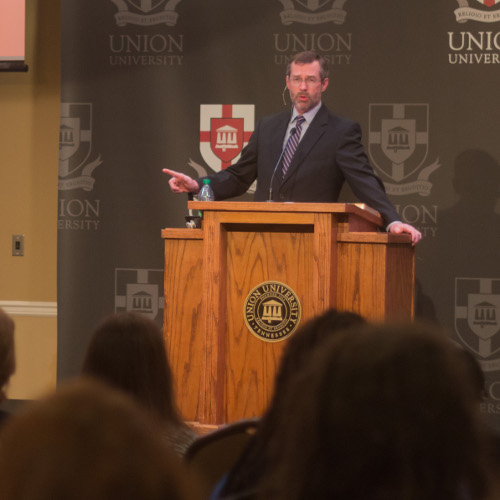JACKSON, Tenn. — Feb. 25, 2019 — Gregory A. Wills, David T. Porter Professor of Church History at Southern Baptist Theological Seminary, said Baptists need to return to the practice of church discipline.
Wills spoke at Union University Feb. 21 as the keynote speaker for the third annual David and Lanese Dockery Lectures on Baptist Thought and Heritage. He gave two lectures on the topic “Conflict and Collaboration: Baptists, the Church and the American Culture.” His afternoon lecture focused on “Individualism and Church Discipline.”
Wills said between 1760 and 1900, Baptists in the South practiced church discipline to a breathtaking degree, excluding nearly 1 million people from church membership and calling between 3 and 4 percent of their members to give account for sin each year.
“Baptists maintained an active church discipline … because they viewed it as a matter of simple obedience,” Wills said. “Christ commanded it.”
He said Baptists believed that God would not bless churches if they refused to obey him by maintaining the purity of the church through church discipline.
“Indeed, Baptist churches in the United States experienced their greatest revivals in the period in which they practiced church discipline,” Wills said.
He said members of Baptist churches pledged to separate from the world and submit to the church. When church members were called to answer for their sins, about 90 percent confessed and repented. Members were called before the church for many transgressions – from violence and adultery to dancing and missing church.
“Baptists in former ages condemned some practices that were in fact good, others that were unobjectionable in themselves and some that were objectionable only because of their associations and circumstances,” Wills said. “But let us give them their due; they at least held their members accountable to some standards.”
Wills said the practice was always irksome and difficult, but by the early 1900s it became implausible. Critiques of this type of church discipline began to seem justified to most Baptists, and by the 1940s, most had abandoned the practice altogether as it seemed to do more harm than good. Wills said while most Baptist leaders continue to support church discipline in principle, they have abandoned it in practice.
“We see the church and the world with very different eyes than Baptists of two centuries ago did,” Wills said. “The world changed. The church changed. In some respects, our beliefs changed. It became about individual autonomy above Christ’s commands.”
Wills said when a pastor as the shepherd of a church omits discipline, he sets a course of disobedience, refuses to defend the sheep and allows for the multiplication of predators, usually to protect the reputation of the church.
“It’s time once again to declare obedience to Christ at the risk of the world’s scorn over disobedience and pursuit of the world’s good will,” Wills said.
In addition to the afternoon lecture, Wills also spoke in an evening lecture on “The Church and Slavery.”

